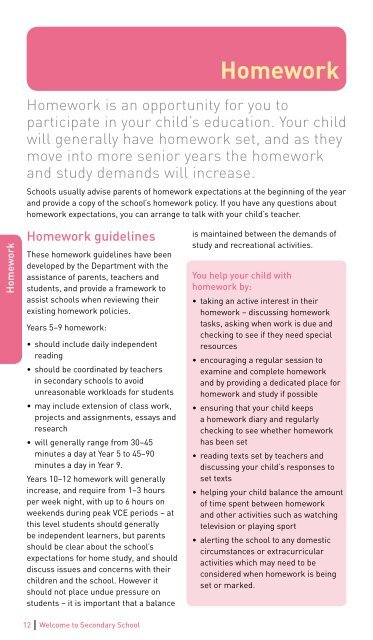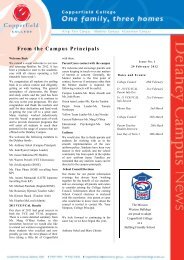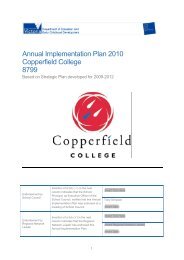Welcome to Secondary School PDF - Copperfield College
Welcome to Secondary School PDF - Copperfield College
Welcome to Secondary School PDF - Copperfield College
You also want an ePaper? Increase the reach of your titles
YUMPU automatically turns print PDFs into web optimized ePapers that Google loves.
Homework<br />
Homework is an opportunity for you <strong>to</strong><br />
participate in your child’s education. Your child<br />
will generally have homework set, and as they<br />
move in<strong>to</strong> more senior years the homework<br />
and study demands will increase.<br />
<strong>School</strong>s usually advise parents of homework expectations at the beginning of the year<br />
and provide a copy of the school’s homework policy. If you have any questions about<br />
homework expectations, you can arrange <strong>to</strong> talk with your child’s teacher.<br />
Homework<br />
Homework guidelines<br />
These homework guidelines have been<br />
developed by the Department with the<br />
assistance of parents, teachers and<br />
students, and provide a framework <strong>to</strong><br />
assist schools when reviewing their<br />
existing homework policies.<br />
Years 5–9 homework:<br />
• should include daily independent<br />
reading<br />
• should be coordinated by teachers<br />
in secondary schools <strong>to</strong> avoid<br />
unreasonable workloads for students<br />
• may include extension of class work,<br />
projects and assignments, essays and<br />
research<br />
• will generally range from 30–45<br />
minutes a day at Year 5 <strong>to</strong> 45–90<br />
minutes a day in Year 9.<br />
Years 10–12 homework will generally<br />
increase, and require from 1–3 hours<br />
per week night, with up <strong>to</strong> 6 hours on<br />
weekends during peak VCE periods – at<br />
this level students should generally<br />
be independent learners, but parents<br />
should be clear about the school’s<br />
expectations for home study, and should<br />
discuss issues and concerns with their<br />
children and the school. However it<br />
should not place undue pressure on<br />
students – it is important that a balance<br />
is maintained between the demands of<br />
study and recreational activities.<br />
You help your child with<br />
homework by:<br />
• taking an active interest in their<br />
homework – discussing homework<br />
tasks, asking when work is due and<br />
checking <strong>to</strong> see if they need special<br />
resources<br />
• encouraging a regular session <strong>to</strong><br />
examine and complete homework<br />
and by providing a dedicated place for<br />
homework and study if possible<br />
• ensuring that your child keeps<br />
a homework diary and regularly<br />
checking <strong>to</strong> see whether homework<br />
has been set<br />
• reading texts set by teachers and<br />
discussing your child’s responses <strong>to</strong><br />
set texts<br />
• helping your child balance the amount<br />
of time spent between homework<br />
and other activities such as watching<br />
television or playing sport<br />
• alerting the school <strong>to</strong> any domestic<br />
circumstances or extracurricular<br />
activities which may need <strong>to</strong> be<br />
considered when homework is being<br />
set or marked.<br />
12 <strong>Welcome</strong> <strong>to</strong> <strong>Secondary</strong> <strong>School</strong>



![Download file [510kb] - Copperfield College](https://img.yumpu.com/51107803/1/184x260/download-file-510kb-copperfield-college.jpg?quality=85)


![Download file [779kb] - Copperfield College](https://img.yumpu.com/42911062/1/184x260/download-file-779kb-copperfield-college.jpg?quality=85)
![Download file [2mb] - Copperfield College](https://img.yumpu.com/41859432/1/184x260/download-file-2mb-copperfield-college.jpg?quality=85)
![Download file [4mb] - Copperfield College](https://img.yumpu.com/41615904/1/184x260/download-file-4mb-copperfield-college.jpg?quality=85)
![Download file [6mb] - Copperfield College](https://img.yumpu.com/36534567/1/184x260/download-file-6mb-copperfield-college.jpg?quality=85)
![Download file [1mb] - Copperfield College](https://img.yumpu.com/35205064/1/184x260/download-file-1mb-copperfield-college.jpg?quality=85)
![Download file [1mb] - Copperfield College](https://img.yumpu.com/33612048/1/184x260/download-file-1mb-copperfield-college.jpg?quality=85)

![Download file [329kb] - Copperfield College](https://img.yumpu.com/24266313/1/184x260/download-file-329kb-copperfield-college.jpg?quality=85)
![Download file [3mb] - Copperfield College](https://img.yumpu.com/24168443/1/184x260/download-file-3mb-copperfield-college.jpg?quality=85)
![Download file [2mb] - Copperfield College](https://img.yumpu.com/23294183/1/184x260/download-file-2mb-copperfield-college.jpg?quality=85)
![Download file [3mb] - Copperfield College](https://img.yumpu.com/23045840/1/184x260/download-file-3mb-copperfield-college.jpg?quality=85)